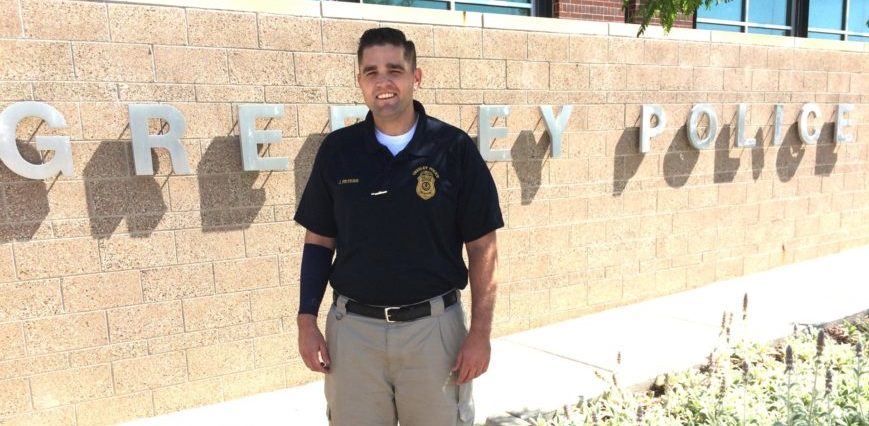
A little more than seven years ago, when U.S. Marine Sgt. Joel Peters lay in a coma following a Humvee accident in East Africa, doctors weren’t sure he was going to live — much less fulfill his dream of following in his father’s and grandfather’s footsteps by becoming a police officer.
Now the 32-year-old father of three is graduating from Colorado State University with a degree in social work and has been hired by the Greeley Police Department.
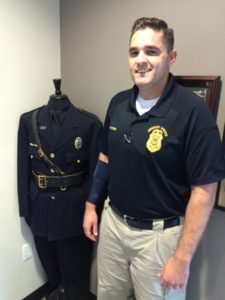 When his vehicle wrecked in 2009, Peters was on his way to help fellow Marines injured by a mortar explosion. He wasn’t wearing the dated vehicle’s seat belt because it wouldn’t fit around his gear. Peters was thrown from the truck, hitting his head and injuring his rotator cuff, ribs and back. He suffered a severe traumatic brain injury, and during his three weeks in a coma, his family was told to prepare for the worst. But he recovered.
When his vehicle wrecked in 2009, Peters was on his way to help fellow Marines injured by a mortar explosion. He wasn’t wearing the dated vehicle’s seat belt because it wouldn’t fit around his gear. Peters was thrown from the truck, hitting his head and injuring his rotator cuff, ribs and back. He suffered a severe traumatic brain injury, and during his three weeks in a coma, his family was told to prepare for the worst. But he recovered.
And yet, as recently as two years ago, Peters still believed what he’d been told at Camp Pendleton: that his traumatic brain injury would prohibit him from ever becoming a cop. So he planned to work with parolees in a counseling role.
A New Start
Peters and his wife Darcy, also a former Marine, now live in Timnath. He attributes much of his successful comeback to the New Start for Student Veterans program in CSU’s Center for Community Partnerships and one of its student-veteran coordinators, Erica Schelly.
He was referred to Schelly while taking classes at Front Range Community College. She helped connect him to resources through New Start, which is based in the Department of Occupational Therapy. The program is funded through the generosity of CSU alumnus and military veteran Dennis Repp and other donors, as well as backing from the federal Department of Veterans Affairs. It supports CSU student veterans by providing services in areas like memory, concentration and/or physical challenges; stress management; academic skills; peer mentoring; recreation; and campus/community resources.
“After I was injured I couldn’t form a complete sentence,” Peters says. “But in my first meeting with Erica, she said, ‘You seem fine to me, why can’t you do what you want to do?’ If it wasn’t for CSU and finding those resources, personally and professionally, I don’t know where I’d be. If there were no CSU, I wouldn’t be in the place I am today, physically and psychologically.”

Jail internship
This spring, Peters took his first step toward becoming a police officer by completing his required social work internship with the Boulder County Sheriff’s Office. He spent most of his 450 hours working in the Boulder County Jail as a “floater,” often defusing volatile situations in a counseling/mediation role.
“I was able to pitch in where they were comfortable having me contribute,” Peters says. “The deputies were patient with me and helped me understand why the policies exist so that I could explain them to the inmates and their families.”
Sometimes it got colorful.
“One day an inmate told me, ‘I could have kicked you in the face just now,’” Peters recalls. “I just said, ‘Thank you for not doing that.’”
Another time, a mother of an inmate yelled at Peters because her son didn’t call her when he was released. “I didn’t take it personally,” he says.
His most rewarding experience came after dealing with a woman who was making a disturbance, yelling and cursing. A few hours later she told him she was sorry.
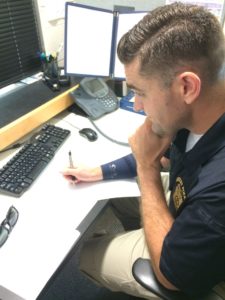
“She had nothing to gain by apologizing,” Peters says. “I know I’ll never see her again, and I know I couldn’t affect her outcome, but getting her to calm down and understand the process helped her.”
The most difficult thing about working for the sheriff’s office, he says, was having to just sit back and observe in many situations, a contrast from his training as a Marine to jump in and fix problems. But his experience with a traumatic brain injury helped him interact with others who had similar injuries.
“A lot of people never got an explanation from a doctor, so it was nice being able to say something like, ‘One of the best things I ever did was starting to read again,’” Peters says. “It was helpful to talk to people with traumatic brain injuries, recognize some of their challenges and share what I did. You can go on a run or do pull-ups, but you can also do workouts for your brain.”
Applying for jobs
After his internship, Peters began to apply for police jobs around the state. After extensive written and oral exams, physical ability tests, background checks and interviews, the Greeley Police Department hired Peters as a public safety technician, a job in which he mostly answered phones and filled out reports.
This month he started at Red Rocks Community College Law Enforcement Academy. After he graduates in December, he’ll return to Greeley for the police department’s five-week in-service academy, followed by three months of field training, after which he will get his badge and become a bona-fide police officer.
“When we did his background check and learned more about the severity of his injuries, we found it remarkable, a miracle,” says Sgt. Jim Blush of the Greeley Police Department, Peters’ supervisor. “When you talk to him, you just don’t see it. It’s amazing where he was and where he is now, because his brain injury is no longer an issue. Everything Joel says is about what he can do, not relying on the doctors or others. He takes it on himself to solve problems, and I don’t think you can teach that. Joel always has a smile on his face and has that attitude of finding a way to help.”
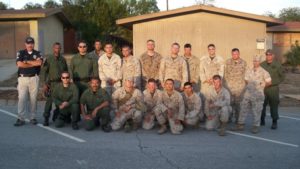
Blush adds that Peters’ social work experience will be invaluable as a police officer.
“When you look at his background and education in social work, he’s a perfect fit,” he says. “We’re usually the ones who need to call in social workers, so he’s a plus-plus for us. It would be nice if every officer had that background. He’s the full package. You have to be able to figure out how to talk to people and what triggers they have.”
‘More to the story’
Peters, who was featured in a CSU video announcing the State Your Purpose fundraising campaign, agrees that his CSU education will serve him well in his new position — and ultimately, in his dream job as a field training officer.
“Social work and law enforcement are intertwined,” he says. “The basis of social work is empowering people to solve problems and achieve goals. In law enforcement, the circumstances can be more severe, but it’s similar. And you’re not just responsible for the life of the victim, but the suspect. You need to understand that there’s usually more to the story.”
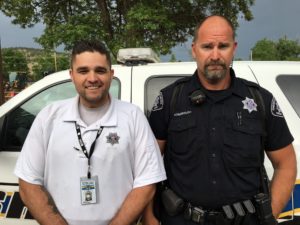
Peters’ grandfather was an officer with the Iowa State Patrol, and his father served with the Redondo Beach Police Department.
“The values and principles that my grandpa taught my dad, he taught me, and I’m teaching my kids,” Peters says. “After I got the conditional job offer with the Greeley police, the first person I called was my dad, and he was really excited. He said, ‘I can’t see you doing anything else.’”
Ultimately, Peters sees value in the adversity that he’s overcome.
“I think a lot of it is patience and learning,” Peters says. “Every life experience I’ve had is about growing and maturing. Everything that looks like an obstacle can be an opportunity. I was put here on this earth for a reason, and I was kept here on this earth for a reason.”
The Department of Occupational Therapy and the School of Social Work are in CSU’s College of Health and Human Sciences.